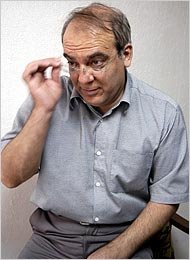Iranian paradox

Hostage-Taker, Reformer, Pessimist: An Iranian Life
When he was a young man, Abbas Abdi thought the shah of Iran had to be overthrown and the United States needed to be punished for supporting the government. So he helped plan and stage the takeover of the United States Embassy and the seizure of 52 Americans, who were held hostage for 444 days.Hmm, what an interesting guy. There's a level of complexity in his life and thinking that's usually missing from most debates involving the Middle East.
Many years later, he thought the Iranian government needed to be more responsive to the people, so he helped to create the reform movement, which twice elected a president, Mohammad Khatami, and fostered hope of greater social and political freedoms.
Now, as Tehran and the West battle over Iran's nuclear program, and ideological conservatives control every branch of government, Mr. Abdi said he saw a country intoxicated by oil wealth and headed toward "social collapse." Both of his historic ventures — helping to form the Islamic Republic of Iran, and helping to develop the reform movement — are, by his own assessment, either finished or hurtling toward oblivion. ...
As much as anybody's life, Mr. Abdi's biography traces the evolution of the Islamic Republic of Iran. He rode the wave of the revolution: as a leader of the student group that seized the embassy; as an official in the early government; as a reformist writer challenging what he saw as a system grown corrupt and disconnected from the people; as an optimist, pushing for democratization; and then as a prisoner, punished and jailed by those who saw his personal evolution as a challenge and a threat.
Mr. Abdi is in a lonely place now, opposed to those holding power and sharply critical of those who led the reform movement. He said the reformers had failed not because their goals were wrong, but because they were too passive. "They did not want to pay a price," he said.
The man whose ideas once served as a barometer of change in Iranian society today expresses cynicism, disgust and concern. "Ahmadinejad's era will become like a tragedy in our history," he said of the president, Mahmoud Ahmadinejad, a characterization certain to further alienate — and even antagonize — Iran's leaders. ...
Mr. Abdi has become an unlikely and in many ways a lone voice in the world, saying the United States has far more moral authority today than it did back in 1979. He seems to respect, even like, his old nemesis, and finds room occasionally to compliment Washington. He even pointed to Iraq, saying that the United States had at least tried to build democratic institutions.
"Just compare America's interference in Kosovo with its interference in Vietnam," he said. "America has changed its policies. Back then it supported dictatorial regimes. But now, for example, it is putting pressure on the Saudis, on Egypt, and calling for change."
And why is America, in his view, promoting democracy over dictatorship?
"I think one reason behind the change is the occupation of the American Embassy," he said. "It gave them a shock to re-examine what they have done. We paid for it, we paid a dear price for it, but others have benefited."
I'm not sure he's right that the hostage-taking marked a watershed moment for how the U.S. treats the rest of the world--after all, we propped up the likes of Ferdinand Marcos in the Phillipines, Manuel Noriega in Panama, and even Saddam Hussein in Iraq for many years after 1979.
But I do think the fact that Iran stood up to the U.S. is an important factor driving our current dispute with Iran over nuclear weapons. On Iran's side, they feel like they're once again in the right in a dispute with mighty America; on our end, we as always have a how-dare-you attitude, enhanced by a deja vu feeling of relative helplessness.
As long as there are people like Abdi in Iran, however, we're not helpless--we just have to figure out a way for the 'right people' to get into power.
I wonder if Iranians feel the same way about America.
Polaris photo of Abbas Abdi by Newsha Tavakolian for the Times
No comments:
Post a Comment